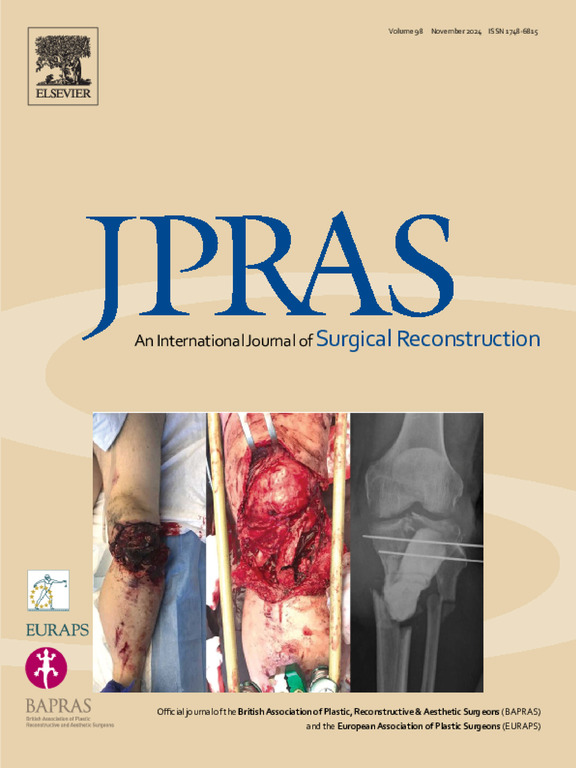Recent trends in nipple reconstruction – A case series and social media analysis of patient preferences
IF 2.4
3区 医学
Q2 SURGERY
Journal of Plastic Reconstructive and Aesthetic Surgery
Pub Date : 2025-07-08
DOI:10.1016/j.bjps.2025.06.042
引用次数: 0
Abstract
Introduction
Patients undergoing mastectomies are often offered nipple reconstruction. Nipple areolar tattooing is also an option chosen by many. The purpose of this study is to highlight trends in nipple reconstruction over time and identify factors that may impact patient decision-making.
Methods
A retrospective review of gender affirming mastectomies performed at a single institution was performed. A Pearson Chi-Square test was run on categorical data while an independent sample t-test was run on continuous data. Existing literature and social media were used to supplement our primary findings.
Results
Four hundred and forty-three adult patients who underwent surgery between 2017 and 2023 were included. The proportion of patients who chose to have nipple grafts decreased from 91% in 2019 to 78% in 2022. Statistically significant factors in deciding to forego nipple grafts were patient’s gender identity, pronouns, and absence of prior testosterone therapy. Discussions held on Reddit forums demonstrated comparable themes for transgender and breast cancer patients when deciding to preserve their nipples or not during their mastectomies.
Conclusions
We have observed anecdotally and objectively that a higher proportion of patients undergoing mastectomies are opting not to pursue surgical nipple reconstruction. There are likely many individual factors that may be related to this decision, including gender identity, perception of added risk, desire to minimize the number of surgeries, and/or option of undergoing future nipple-areolar tattooing. Social media discussions regarding this topic highlight its relevance for patients undergoing both breast reconstruction and gender affirming surgery.
乳头重建术的最新趋势-患者偏好的病例系列和社交媒体分析
乳房切除术后,患者常接受乳头重建手术。乳头乳晕纹也是很多人的选择。本研究的目的是强调随着时间的推移乳头重建的趋势,并确定可能影响患者决策的因素。方法回顾性分析在单一机构进行的性别确认乳房切除术。对分类数据进行Pearson卡方检验,对连续数据进行独立样本t检验。现有文献和社交媒体被用来补充我们的主要发现。结果纳入2017年至2023年间接受手术的443名成年患者。选择乳头移植的患者比例从2019年的91%下降到2022年的78%。决定放弃乳头移植的统计学显著因素是患者的性别认同、代词和既往未接受过睾酮治疗。Reddit论坛上的讨论展示了变性人和乳腺癌患者在乳房切除术中决定保留乳头或不保留乳头时的类似主题。结论:我们客观地观察到,接受乳房切除术的患者中有较高比例的人选择不进行手术乳头重建。可能有许多个人因素可能与这个决定有关,包括性别认同,对增加风险的感知,希望尽量减少手术次数,和/或选择将来进行乳头-乳晕纹身。关于这个话题的社交媒体讨论强调了它与接受乳房重建和性别确认手术的患者的相关性。
本文章由计算机程序翻译,如有差异,请以英文原文为准。
求助全文
约1分钟内获得全文
求助全文
来源期刊
CiteScore
3.10
自引率
11.10%
发文量
578
审稿时长
3.5 months
期刊介绍:
JPRAS An International Journal of Surgical Reconstruction is one of the world''s leading international journals, covering all the reconstructive and aesthetic aspects of plastic surgery.
The journal presents the latest surgical procedures with audit and outcome studies of new and established techniques in plastic surgery including: cleft lip and palate and other heads and neck surgery, hand surgery, lower limb trauma, burns, skin cancer, breast surgery and aesthetic surgery.

 求助内容:
求助内容: 应助结果提醒方式:
应助结果提醒方式:


